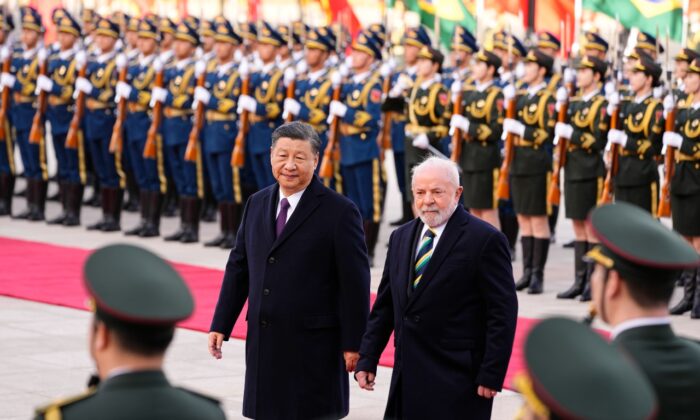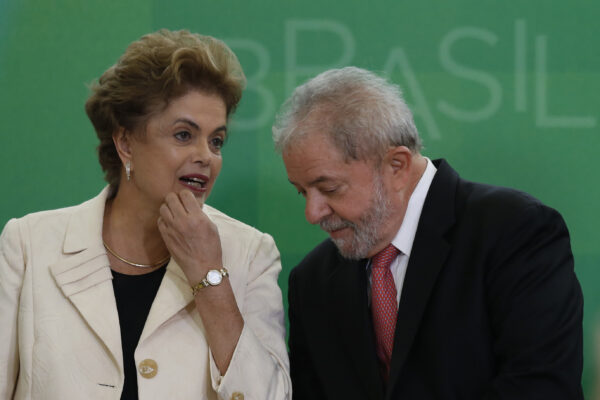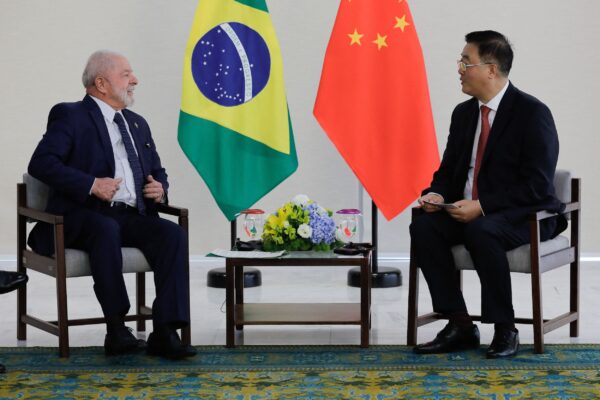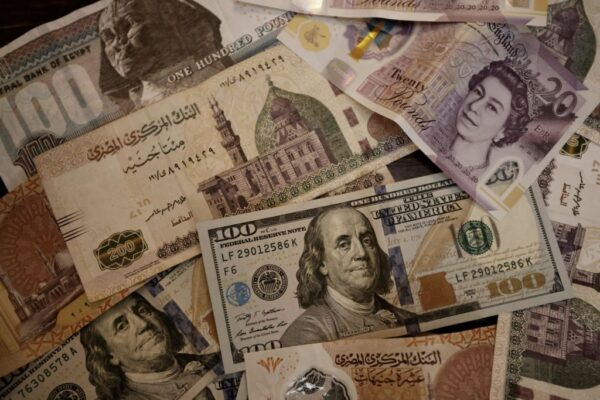
Brazilian President Luiz Inacio Lula da Silva (R) inspects an honor
guard with Chinese leader Xi Jinping during a welcome ceremony held
outside the Great Hall of the People in Beijing, China, on April 14,
2023. (Ken Ishii,-Pool/Getty Images)
Amidst the buzz surrounding Brazilian President Luiz Inácio Lula da Silva’s China visit that began on April 12, the leaders of both countries have signed more than 20 new bilateral agreements.
On the surface, the trip was a run-of-the-mill diplomatic visit. However, some say it underscores an ongoing deprioritization of relations with the United States.
China is Brazil’s largest trade partner, and both nations operate as cornerstone members of the trade bloc known as BRICS. This alliance also includes Russia, India, and South Africa. Members of the trade bloc openly share a desire to displace the U.S. dollar in trade and as a global reserve currency.
Since the return of left-wing Lula to Brazil’s helm, U.S. officials and analysts have raised concerns over the South American country’s policy shift in favor of Beijing and other authoritarian regimes.
It started with Lula’s welcoming of Iranian warships on Feb. 26. This was promptly followed by the March 29 announcement that Brazil would begin using the Chinese yuan instead of the U.S. dollar in trade transactions.
During a Senate Foreign Relations Committee hearing last month, Sen. James Risch (R-Idaho) expressed alarm over Brazil’s overarching cooperation with what he called “maligned foreign influences,” including China.
Brian Nichols, assistant secretary of state for Western Hemisphere Affairs in the U.S. Department of State, said in the same hearing that he’s “absolutely concerned” about China’s heavy investment.
Part of the Brazil-China arrangement includes using the Beijing-backed New Development Bank (NDB) as a yuan clearing facility. The goal is to boost the volume and strength of China’s yuan in the Americas.
While in Shanghai, Lula oversaw the inauguration of Dilma Rousseff—his former chief of staff and a 1960s Marxist guerilla fighter—as the new head of the NDB. Rousseff served as Brazil’s president after Lula starting in 2011, but was impeached by congress in 2016 for budget mismanagement.

The NDB was created under Rousseff’s watch, so her appointment as the head of the NDB on April 13 was the cherry on top of policy decisions that have left Western officials spinning in recent months.
Analysts say Brazil moving away from the U.S. dollar and courting authoritarian regimes demonstrates the prioritization of BRICS, particularly China, ahead of its relationship with the United States.
Writing on the Wall
Some Brazilians assert Lula’s deepening of ties with China and pushing BRICS into the spotlight has been a long time coming.
“They [BRICS] basically want to annul the United States as a world power,” Brazil’s former minister of foreign affairs, Ernesto Araújo, told The Epoch Times.
Araújo said Lula was focused on strengthening ties with anti-American governments well before his return to office in January.
But Araújo in’t surprised. Lula is a founding member of UNASUR, a South American trade bloc created in 2008 with former Venezuelan president Hugo Chavez. At the time, Chavez said UNASUR was designed to usurp the influence of the United States in the region.
Araújo noted that while working as the minister of foreign affairs under former President Jair Bolsonaro, the BRICS agenda took a backseat. However, with Lula in charge, China and BRICS have been bumped to the top of Brazil’s political priority list.
“Now it’s clear that Lula wants to go full speed with BRICS,” Araújo said.
During Lula’s visit, China’s Ministry of Foreign Affairs released a press statement on April 14 saying Chinese leader Xi Jinping declared China and Brazil as the “two biggest developing countries and emerging markets in the Eastern and Western hemispheres.”
The brief added the two countries have “extensive common interests.”

For some security analysts, therein lies the danger to the United States.
“Brazil already has a long-standing relationship with China, but the current turn is particularly precarious,” Irina Tsukerman, regional security analyst and founder of Scarab Rising, told The Epoch Times.
Tsukerman noted that China pumping massive amounts of cash into Brazil’s economy has essentially purchased loyalty, making Beijing’s anti-Western influence difficult to counteract.
“Brazil, like Venezuela, is about to become a central point for strong networks across Latin America. Intelligence networks, drug cartels, assisting China with its fentanyl trafficking operations … and political influence favorable to Beijing’s interests and concerning to U.S. security interests,” she said.
Weaker Sanctions
Among the potential U.S. security impacts is the threat a weaker dollar poses to the strength of its sanctions.
The United States has led a heavy sanctions package against Russia amidst its ongoing attack on Ukraine. Concurrently, nations affected by the economic fallout of the Russia-Ukraine conflict have been searching for an alternative to dwindling greenback reserves. This is especially true in Latin American countries like Brazil and Argentina.
The result has been a general readiness to abandon the dollar and build infrastructure for a new global reserve currency. This is chief among the list of goals for BRICS.
On a large enough scale, “de-dollarisation” will weaken the power of U.S. sanctions abroad, essentially diminishing one of the most powerful non-military weapons at its disposal.
Almost half of all global trade is conducted in dollars. Greenbacks also comprise 60 percent of total foreign currency reserves.
But as commodity inflation crippled countries in 2022, the debate for alternative currencies was reignited.

“While yuan as an exchange currency in the immediate future will not fully replace the U.S. dollar in Latin America, even adopting it … creates a risk to weaken U.S. financial influence and facilitates sanctions circumvention. Not only for China and Russia but also for all their regional allies,” Tsukerman said.
Meanwhile, Nichols said the administration of U.S. President Joe Biden aims to demonstrate the United States is still the best country to align its opportunities and future with.
“We see around the hemisphere the promises the PRC [People’s Republic of China] makes about the quality of its investments, about the debt associated with its investments, are false,” Nichols added.
No comments:
Post a Comment